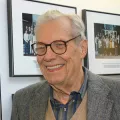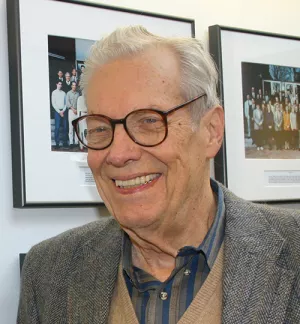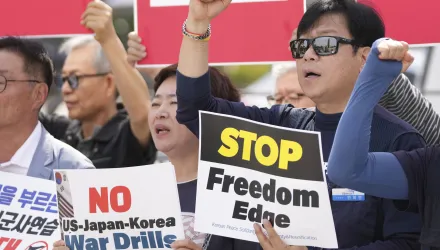International Security is America's leading peer-reviewed journal of security affairs.
As soon as Paul Doty launched what is now Harvard’s Belfer Center for Science and International Affairs in 1974, he began planning a scholarly journal on international security. He shrugged off colleagues’ concerns that there would be little market for such a journal.
Thirty-six years after the first issue appeared in the summer of 1976, the Belfer Center’s quarterly International Security consistently ranks No. 1 or No. 2 out of over 70 international affairs journals surveyed by Thomson Reuters each year. In the latest issue, articles by Nuno Monteiro and Michael Beckley have set the scholarly blogosphere abuzz, debating unipolarity and U.S. decline.
International Security is one of the proudest and liveliest legacies of Doty, who died in December at the age of 91. Founding co-editor Michael Nacht, reflecting on Doty’s determination to redefine the global agenda on science and security policy, said, “I honestly believe that Paul’s vision has been fully realized. And the journal is a central pillar of that vision.”
Doty’s journal long ago silenced the doubters: IS is deluged with submissions; nearly 300 authors submit articles annually vying for about 20 slots per year.
It helps to have one of the most knowledgeable and experienced editorial teams anywhere. Editor-in-chief Steven E. Miller, who also directs the Belfer Center's International Security Program (ISP), joined the journal in 1979, and coeditor Sean Lynn-Jones arrived in 1987. Owen R. Coté, a former Belfer Center research fellow and now assistant director of MIT’s Security Studies Program, has been coeditor since 1993. Managing editor Diane McCree is the newcomer – she joined a mere 15 years ago.
Miller said that in envisioning the journal, Doty “saw a niche opportunity and went for it 100 percent. He didn’t try to copy existing publications.”
Doty declined advice to call the journal “National Security” because he believed the still-emerging field of international security needed scholarship to assess complex policy questions such as nuclear weapons and arms control. Nacht said: “Paul was not a nationalist. He wanted to help humankind.”
While the journal is certainly scholarly, it insists on clarity and readability. As Lynn-Jones put it, “We don’t hesitate to edit or rewrite to make articles accessible. We get rid of the jargon. We have a clear introduction, a ‘roadmap paragraph,’ a conclusion, and a point.”
Miller added: “Even for the most scholarly articles, we are always sensitive to the ‘so what’ question. What impact will it have for the real world?”
For example, Monteiro, a Yale professor, challenged the notion that a unipolar world has led to a decline in violent conflict. His article prompted a cover story in the Boston Globe’s Sunday “Ideas” section.
Beckley’s article questioning American decline had similar impact. “Here’s a huge debate on U.S. decline and he comes in and takes a big swing at a big question, and he frames the debate in an important new way,” Miller said.
The National Interest magazine said of Beckley’s article: “This is an important and notable piece that shows how rigorous academic research can inform our understanding of major policy debates.”
It wasn’t surprising that the journal featured work by Beckley, a doctoral candidate at Columbia University and an ISP Fellow. “I don’t think the journal has ever hesitated to publish a young, unknown scholar who has produced excellent work,” said Lynn-Jones. “We’ve had a lot of first articles by people who went on to become very prominent.”
Miller added: “This is very much in keeping with Paul Doty’s legacy – that he wanted a vehicle to develop the next generation of scholars in the field.”
Stephen Walt, for example, wrote a breakthrough journal article, “Alliance Formation and the Balance of World Power,” in 1985. Walt is now a Kennedy School professor and faculty chair of the ISP.
The journal’s impact goes beyond the printed copies and online version. IS articles are frequently used in university courses across the country. The program also publishes thematic collections of journal articles called IS Readers.
The ISP fellowships are another Doty legacy. The ISP hosts more than 40 fellows every year, and the program has had nearly 600 fellows since 1973 (Miller was a fellow from 1977-79).
“With the fellows program, we are one of the primary arbiters of young talent in the field, Miller said. “And with the journal, we are a primary arbiter of scholarship in the field.”
Some thought the journal would wither after the end of the Cold War, given its early focus themes such as détente and the Cold War balance of forces. In fact, “far from being out of business, we ended up with a much bigger, richer agenda, with issues like, ‘What does it mean for the U.S. to be the sole superpower?” Miller said. “No one can write about US primacy without studying IS articles.”
McCree said the editors interpret the scope of international security broadly. One article discussed human security; another looked at the “Don’t Ask, Don’t Tell” policy. “The journal evolves with what’s happening in the world,” she said. “It’s no longer a Cold War world, but a much more complicated world.”
Peter Feaver, a Duke University political science professor and former National Security Council staff member, lauded the journal’s breadth and quality in a recent blog ForeignPolicy.com post on the strength of the Winter 2011/12 issue.
Feaver called International Security “the top academic journal in the field of security studies and one of the highest-impact journals in the entire discipline of political science. I was struck by how policy relevant the issue was, without sacrificing in any way academic rigor.”
Smith, James. “Paul Doty's Legacy Lives on Through Influential Journal.” Spring 2012







